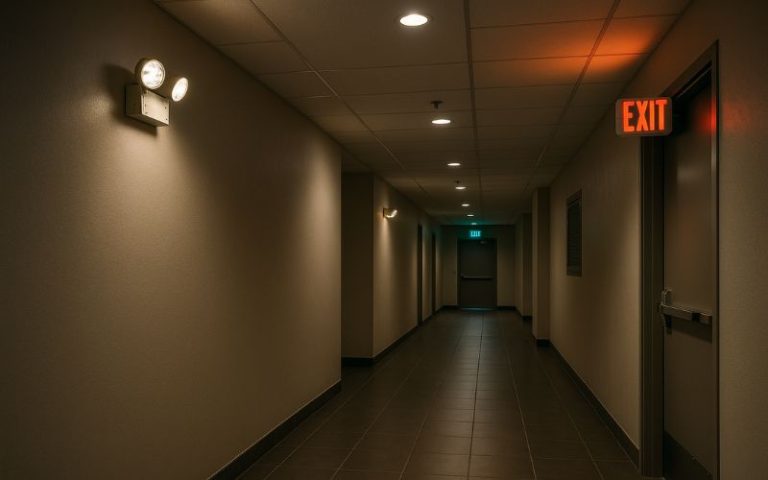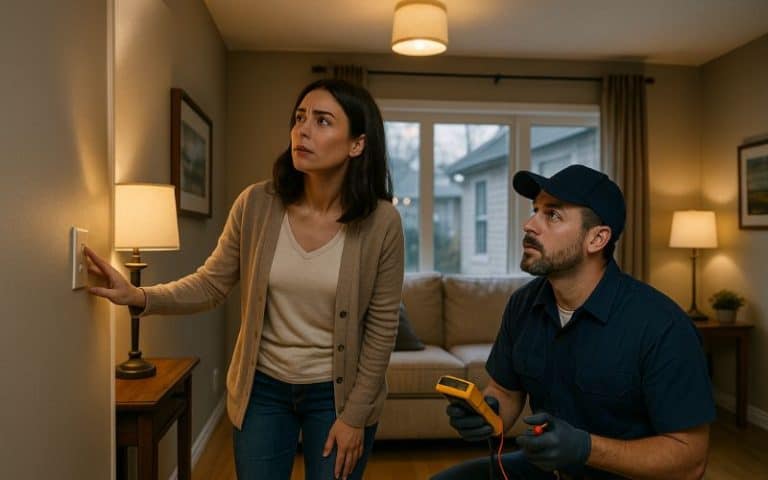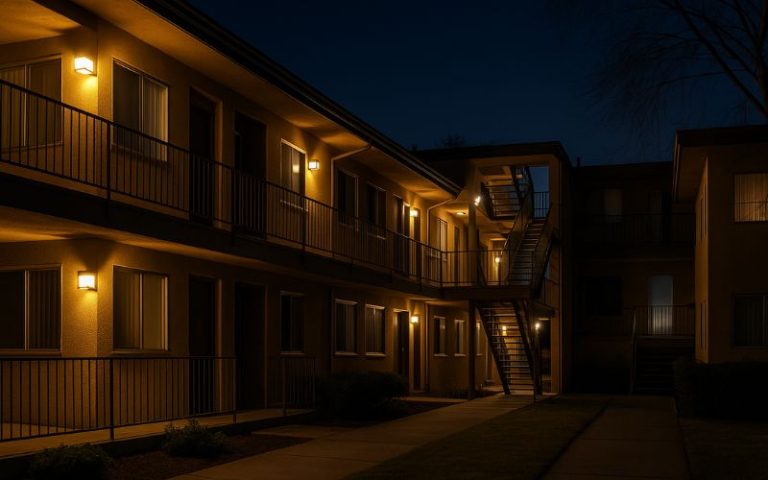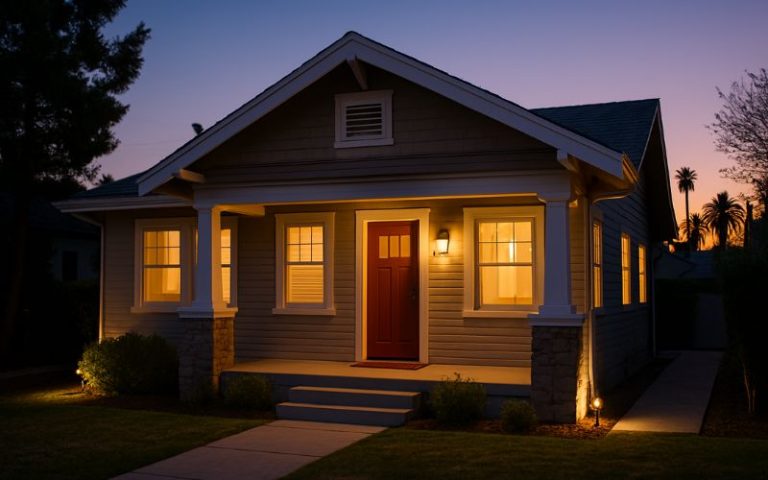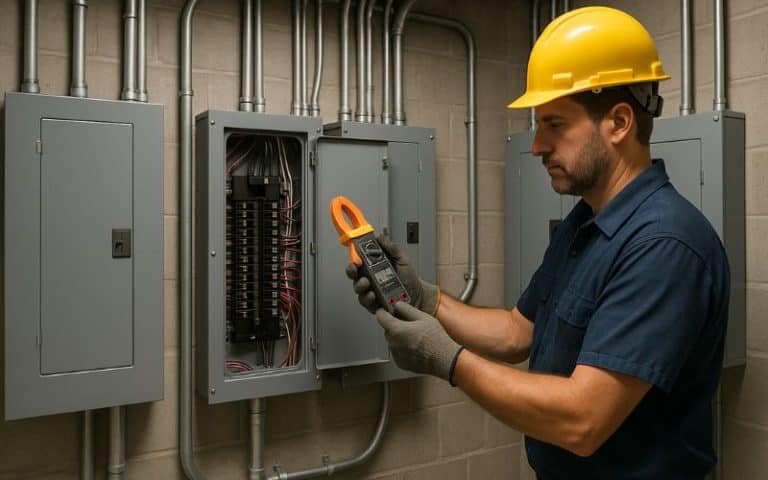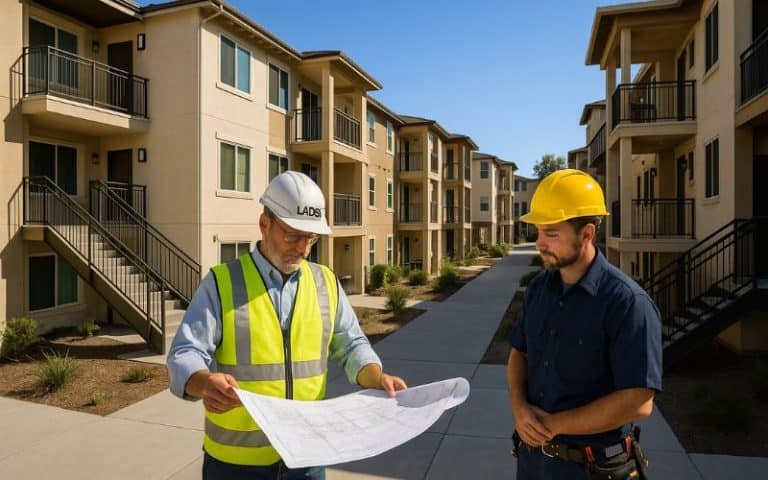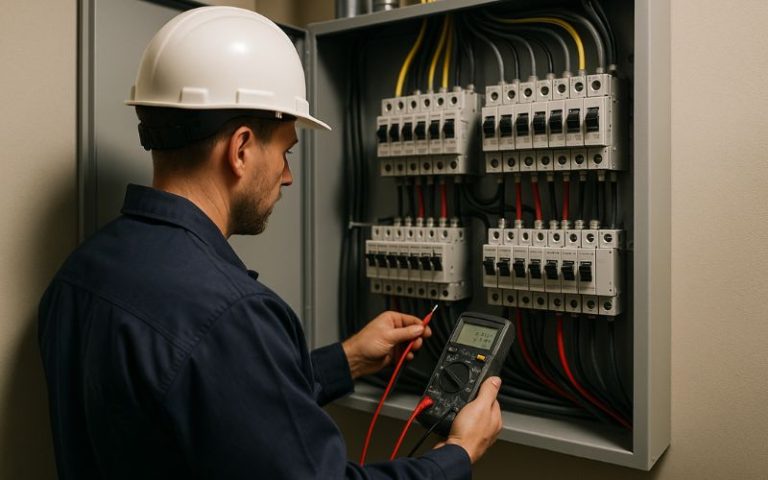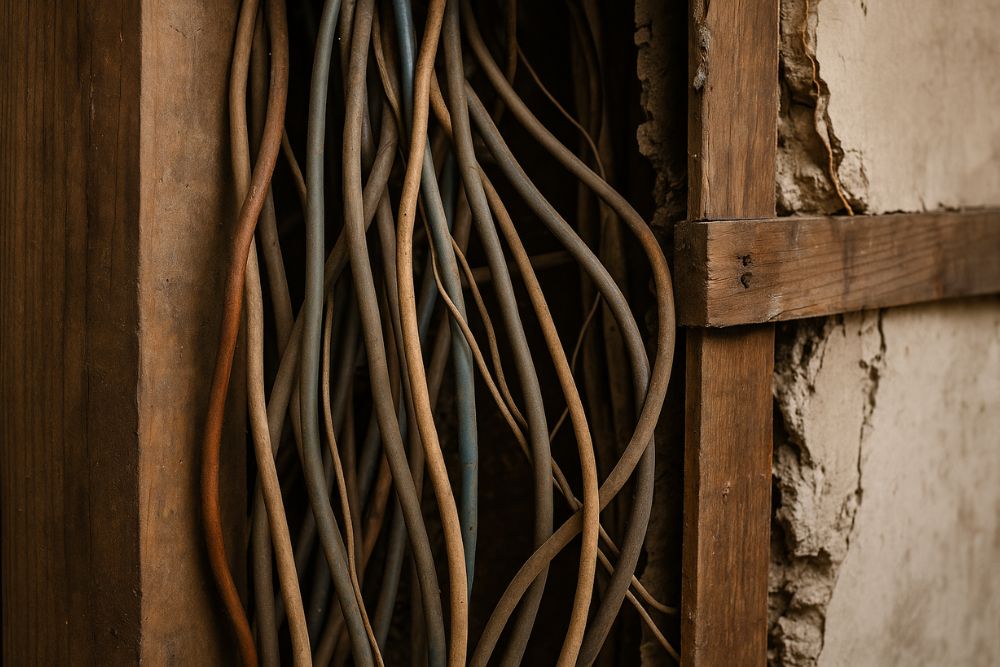
Electrical Wiring Problems in Older Los Angeles Buildings
Los Angeles has no shortage of charm when it comes to older properties. From Spanish Revival apartments in Silver Lake to mid-century office buildings in Koreatown, these structures embody the city’s history and culture. But beneath the plaster walls and vintage light fixtures lies a less glamorous reality: outdated electrical wiring that was never intended to power the technology-driven lifestyles of today.
Think about how different things were when many of these properties were built. A few lamps, a single refrigerator, and perhaps a radio or television were considered a full electrical load. Fast forward to 2025, and tenants are plugging in laptops, gaming systems, smart appliances, space heaters, and EV chargers, often all in the same unit. Businesses rely on servers, energy-intensive HVAC systems, and advanced lighting controls. The electrical demands are exponentially higher, yet in many buildings, the wiring remains stuck in the past.
For Los Angeles property managers and landlords, this creates a serious set of challenges. Outdated wiring is more than just an inconvenience, it is a major risk factor for fires, injuries, and costly liability issues. In fact, the National Fire Protection Association (NFPA) reports that electrical failures remain one of the leading causes of structure fires across the U.S. In California’s dense urban areas, the consequences can be devastating, not only in terms of property damage but also in terms of tenant safety and potential lawsuits.
The reality is that electrical wiring doesn’t last forever. Insulation breaks down, circuits become overloaded, and technology leaves old systems behind. If you manage a building that predates the 1980s, or even newer structures that haven’t been properly maintained, it’s worth asking whether the wiring inside those walls is putting you at risk.
In this article, we’ll explore the most common wiring problems found in older Los Angeles buildings, what red flags to look out for, and how a licensed electrician like RG Electric can help property managers and owners bring their properties back into compliance. The goal isn’t just to avoid disaster but to protect tenants, maintain property value, and stay ahead of insurance and code requirements that are becoming stricter each year.
The Hidden Risks of Aging Electrical Wiring
The biggest problem with outdated wiring is that it often operates silently until something goes wrong. Unlike a leaky faucet or a cracked window, wiring issues are hidden behind walls, ceilings, and floors. By the time symptoms appear, the damage may already be significant.
One of the most pressing risks is fire. As wiring ages, the protective insulation surrounding the conductors can become brittle or cracked. This exposes bare wires that can spark and arc when they come into contact with each other or nearby surfaces. Combine that with the fact that many older systems lack modern safety devices such as arc-fault circuit interrupters (AFCIs), and you have a recipe for disaster. For property managers, a single electrical fire could result in tens of thousands of dollars in damages, not to mention potential injury claims from tenants.
Another major concern is overloaded circuits. When buildings were first wired decades ago, circuits were sized for much smaller loads. A single 15-amp circuit may have been sufficient for a few lights and outlets. Today, that same circuit might be supporting multiple high-draw appliances, leading to frequent breaker trips or, worse, wires overheating. Over time, this constant stress degrades the wiring even further, making future failures more likely.
Shock hazards also become more common with outdated systems. Some older wiring methods, like knob-and-tube, were installed without a grounding conductor, leaving no safe pathway for stray electrical current. This puts tenants, maintenance workers, and even property managers at risk of dangerous shocks during everyday use.
Finally, insurance companies are increasingly unwilling to cover properties with outdated wiring systems. Carriers recognize the elevated risks of knob-and-tube or aluminum wiring and may either increase premiums substantially or deny coverage altogether until the wiring is replaced. For property owners in Los Angeles, this can make a building both more expensive to operate and harder to insure.
If you’re managing a building and noticing signs such as flickering lights, warm or discolored outlets, or frequent breaker trips, these are not minor annoyances. They are early warning signs that the wiring is no longer safe. Ignoring them can expose you to mounting liability and potentially catastrophic losses.
👉 For related issues, see our post on shared electrical circuits in Los Angeles apartments, which explains how overloaded circuits can quietly put your property at risk.
Common Types of Outdated Wiring Found in Los Angeles Buildings
Los Angeles has buildings from every era, Spanish-style apartments built in the 1920s, sleek mid-century offices from the 1960s, and sprawling multi-unit complexes from the 1980s. With each era came different wiring practices, and many of those systems are still in service today. Unfortunately, not all wiring types have stood the test of time. Some are now considered unsafe, while others simply can’t keep up with modern electrical demands.
Here are the most common outdated wiring types we still find in LA properties:
Knob-and-Tube Wiring
Knob-and-tube (K&T) wiring was common in the early 1900s through the 1940s. It used ceramic knobs to secure wires and tubes to protect them when passing through framing. While innovative for its time, K&T has several shortcomings:
- It lacks a grounding conductor, which means there’s no safe pathway for stray electrical current.
- The wires were originally installed with insulation that deteriorates over decades, leaving bare conductors exposed.
- Splices were often made outside of junction boxes, creating unsafe and inaccessible connections.
In Los Angeles, many properties built before World War II still contain remnants of knob-and-tube wiring. While some insurance companies flat-out refuse to cover properties with active K&T, others require complete rewiring before issuing or renewing policies.
Aluminum Wiring
From the mid-1960s through the late 1970s, aluminum wiring was commonly used in residential and multi-unit construction due to copper shortages. While it was cheaper, it brought dangerous side effects:
- Aluminum expands and contracts more than copper, leading to loose connections over time.
- These loose connections can generate heat, increasing the risk of arcing and fires.
- Aluminum is also prone to oxidation, which further degrades connections.
In fact, studies by the U.S. Consumer Product Safety Commission (CPSC) have linked aluminum wiring with a higher likelihood of electrical fires compared to copper. Many Los Angeles landlords are unaware that their properties may still contain this wiring, especially in units that have not been renovated since the 1970s.
Cloth-Insulated Wiring
Before modern plastics became the norm, electrical wiring was often insulated with cloth or rubber. Over time, both materials degrade significantly, leaving wires brittle and prone to cracking. This exposes conductors and increases the risk of shorts or shocks. Cloth-insulated wiring is also more susceptible to rodent damage, which is particularly problematic in older LA apartment complexes.
Undersized Circuits
Even if the wiring material itself is intact, many older systems simply don’t have the capacity to handle today’s loads. A 60-amp service panel may have been sufficient for a 1950s apartment, but today’s tenants expect to run air conditioners, multiple refrigerators, entertainment systems, and charge electric vehicles, all of which require far more power.
This mismatch between demand and capacity leads to constant circuit breaker trips, overheating, and tenant complaints. Worse, some outdated systems were never designed with circuit breakers at all, relying instead on fuses, which offer far less protection against overloads.
Why It Matters for Property Managers
For Los Angeles property managers, knowing the type of wiring inside your building isn’t just academic—it’s a crucial step in risk management. Knob-and-tube, aluminum, and cloth-insulated wiring all pose documented safety hazards. Undersized circuits, meanwhile, create operational headaches and unhappy tenants.
If you’re unsure what kind of wiring your property contains, the safest approach is to schedule an electrical inspection with a licensed contractor. During an inspection, our team at RG Electric can trace circuits, identify outdated systems, and recommend upgrades that comply with LADBS code requirements.
For more information about code and compliance in rental properties, see our article on electrical code compliance in Los Angeles.
Warning Signs of Wiring Problems in Older Los Angeles Buildings
One of the biggest challenges with outdated wiring is that it hides behind walls and ceilings, making it difficult to spot until problems surface. But as a property manager or landlord, you can often pick up on warning signs before they turn into emergencies. Recognizing these red flags early could mean the difference between a safe property and a costly fire or outage.
Flickering or Dimming Lights
If tenants regularly report flickering or dimming lights, it’s often a sign that the wiring can’t handle the electrical load. In some cases, this may be caused by shared circuits, where multiple high-demand appliances are connected to the same breaker. In older wiring systems, even something as simple as a microwave and an air conditioner running at the same time can push circuits past their limits.
Frequent Circuit Breaker Trips or Blown Fuses
While circuit breakers are designed to trip as a safety measure, frequent trips are not normal. This usually indicates that circuits are overloaded or wires are overheating. In older properties that still rely on fuses, repeated blown fuses are a sign that the electrical system is undersized and unsafe for modern use.
Warm or Discolored Outlets
If outlets feel warm to the touch, appear scorched, or show discoloration, this is a red flag for loose connections or overloaded circuits. Warm outlets can also signal aluminum wiring problems, as the expansion and contraction of the metal cause connections to loosen over time.
Buzzing Sounds or Burning Smells
Any unusual sounds, like buzzing behind walls or outlets, should be treated as urgent. These noises often point to arcing, when electricity jumps across gaps between wires or connections. A burning smell, especially near outlets or panels, means insulation is breaking down, and the property may be dangerously close to an electrical fire.
Outdated Electrical Panels
Even if the wiring itself isn’t visibly failing, an outdated electrical panel is often the root cause of wiring issues. Panels that are too small, poorly maintained, or from outdated brands like Federal Pacific or Zinsco pose serious risks. These panels may fail to trip during overloads, leaving wires to overheat and spark fires.
For property managers in Los Angeles, these symptoms aren’t just maintenance issues, they are compliance and liability concerns. Tenants may complain about convenience, but insurance carriers and inspectors will see them as signs of neglect. If you notice any of these issues in your property, scheduling an electrical safety audit in Los Angeles should be your next step.
The Cost of Ignoring Wiring Issues in Older Buildings
It’s tempting to put off electrical upgrades, especially when a building “seems” to be working fine. But ignoring wiring problems is often far more expensive than addressing them proactively. For Los Angeles property managers, the risks fall into three main categories: financial costs, tenant safety, and legal liability.
Financial Costs
Delaying repairs or rewiring can lead to larger problems over time. For instance, an overloaded circuit may cause appliances to fail prematurely, creating replacement costs that add up quickly. Worse, an electrical fire could result in tens or even hundreds of thousands of dollars in property damage, often far exceeding the cost of rewiring or upgrading panels in the first place.
Insurance premiums are another hidden cost. Many insurers charge higher rates—or refuse coverage—if outdated wiring is present. Once wiring is updated, however, many property owners see a reduction in premiums, making upgrades a smart financial move.
Tenant Safety and Retention
Tenants expect safe, reliable electricity. If they experience constant outages, shocks, or see burn marks on outlets, they are far less likely to renew leases. In a competitive Los Angeles rental market, tenant turnover is costly. Investing in wiring upgrades not only prevents accidents but also boosts tenant satisfaction and retention.
Safety is the most critical concern. A wiring-related fire or shock incident could result in serious injury or even loss of life. Beyond the moral responsibility of keeping tenants safe, property managers face enormous liability risks if accidents are tied to neglected wiring.
Legal and Compliance Issues
The Los Angeles Department of Building and Safety (LADBS) enforces strict electrical codes, and inspectors are paying closer attention to older buildings. Failure to address wiring problems can result in citations, fines, and mandatory repairs under tight deadlines. In some cases, inspectors may even deem parts of a building unsafe for occupancy until wiring is replaced.
For commercial properties, OSHA (Occupational Safety and Health Administration) compliance adds another layer of responsibility. Employers in outdated buildings could face violations if employees are exposed to unsafe electrical conditions.
Long-Term Property Value
Electrical systems are part of what makes a property marketable. Prospective buyers and investors see outdated wiring as a liability, lowering property value. By contrast, a recently rewired building with modern panels and proper grounding demonstrates care and compliance, making the property more attractive to buyers, lenders, and insurers alike.
Simply put, ignoring wiring problems is like gambling with your property. The odds may feel safe until something goes wrong, but when it does, the consequences are severe. Partnering with a licensed electrician like RG Electric ensures that you’re not only protecting your tenants but also your investment.
How RG Electric Solves Wiring Problems for Los Angeles Property Managers
At RG Electric, we know that outdated wiring is more than just a maintenance issue, it’s a safety hazard, a compliance challenge, and a threat to your bottom line. That’s why our services for Los Angeles property managers go beyond quick fixes. We deliver long-term, code-compliant solutions that protect your investment and keep tenants safe.
Comprehensive Electrical Inspections
Every wiring project begins with a detailed electrical safety audit. Our licensed electricians evaluate the age, type, and condition of wiring throughout your property. We check for signs of overheating, grounding issues, improper splicing, and outdated panels. Once complete, we provide a clear report with recommendations tailored to your property, so you’ll know exactly where risks exist and how to address them.
Code-Compliant Rewiring
If your building still relies on knob-and-tube, aluminum, or cloth-insulated wiring, our team can perform full rewiring with modern copper conductors and updated panels. We ensure every installation complies with LADBS codes and California Title 24 standards, helping you avoid costly citations and fines. For commercial properties, we also account for OSHA safety requirements, giving property managers peace of mind that tenants and employees are fully protected.
Panel and Circuit Upgrades
Many wiring problems trace back to undersized panels and overloaded circuits. We install and upgrade panels that can handle modern loads, including HVAC systems, office equipment, and EV chargers. For multi-unit properties, we design circuit layouts that prevent shared circuit issues and reduce the risk of outages or overloads.
Tenant Improvement Electrical Work
If you’re renovating for new tenants, we can reconfigure wiring, add circuits, and install modern outlets and lighting systems. This not only keeps the space compliant but also enhances tenant satisfaction and boosts rental value.
Preventive Maintenance Plans
Rewiring isn’t always a one-time fix. That’s why we offer ongoing electrical maintenance plans for multi-unit and commercial properties. Our team schedules regular inspections, breaker testing, surge protection upgrades, and fire safety checks, so wiring issues are caught and corrected before they escalate.
A Proven Track Record in Los Angeles
Over the years, we’ve helped property managers across Los Angeles, from vintage apartment complexes in Hollywood to large commercial facilities in Downtown LA. In one case (with names changed to protect privacy), a mid-city landlord contacted us after tenants reported frequent breaker trips and warm outlets. Our inspection revealed aluminum branch wiring that had begun to loosen at connections. We performed a targeted rewiring, upgraded the panel, and added surge protection. The result? A safer building, lower insurance premiums, and far fewer tenant complaints.
At the end of the day, you don’t need to be an electrician to recognize the dangers of outdated wiring—but you do need a trusted partner to fix them. RG Electric is here to provide that partnership. Whether you need a full rewiring, a safety audit, or preventive maintenance, our team delivers the expertise and reliability Los Angeles property managers depend on.
👉 Call us today at (323) 521-5131 or request a free estimate online.
For more resources, check out our guides on:

